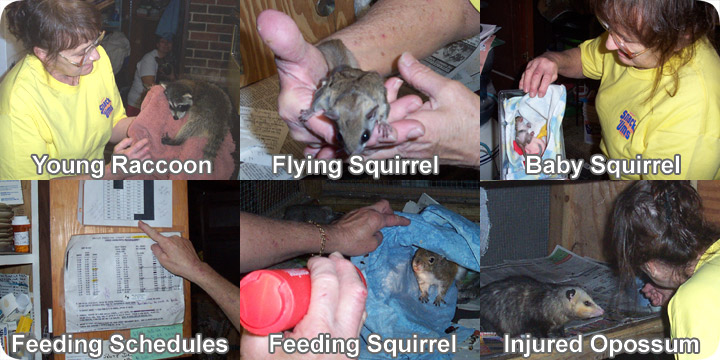-
info@aaanimalcontrol.com
Call us for help in your town
Humane Wildlife Education
Orlando Wildlife Rehabilitation

01.06.2004 - I'd like to introduce you to a wonderful woman. Her name is Lee Harr. For more than ten years now, she's operated a wildlife rehabilitation facility out of her own home. She pays all of the expenses out of her own savings. Her goal is
to care for injured, sick, and orphaned wild animals. From raccoons to squirrels to birds and almost anything, she has a wonderful gentle touch and understanding of wildlife, and a relentless drive to help wild critters. She works non-stop, 16 hours a day,
seven days a week, and she absolutely loves animals.
She takes a no-nonsense approach to rehabilitation, and wants what is best for the animals. She tough. She's not some weepy watery-eyed critter hugger. Her arms and legs are littered with scars, the
scratches from handling wild critters for so long. She makes sure that all of the animals are properly fed and vaccinated, and she keeps a meticulous schedule and records. Her goal is to rehab animals and then release them in the best environments that will
ensure their survival in the wild. She has a great deal of experience, and can handle everything from infant squirrels to adult raccoons with broken legs. She truly puts animals before herself, and she's a selfless and wonderful woman.
Lee is a lot of fun to visit, and fun to talk to! I first got in contact with her when I removed an injured wild bird from a house in Orlando. After I left with the bird, as I was on my way to Back To Nature Wildlife in east Orlando, I got a call from Lee.
She'd heard about the bird, because the customer called her after I'd left, and Lee wanted to make sure that I was going to treat the bird right. Lee let me know that she operated her own wildlife rehab facility closer to downtown, and so I started to go to
her any time I had an orphaned or injured critter.
Mostly, I've brought her baby raccoons and opossums that lost their mother. I run into this often. Additionally, people call me with various injured wildlife, and I refer them to Lee, or even pick up the
critters and bring them to Lee's wildlife rehabilitation center in Orlando Florida. Lee always takes great care of the animals, and I'm very thankful that I've met her, as I'm sure are many of the critters she's saved over the years!
For more wildlife stories, click my Wildlife Blog
or click my below banner to hire a local trapper.
Responsibility of Rehabilitation
Wildlife rehabilitation centers are available to care for and support injured and endangered wildlife species. Rehabilitating an injured wild animal can be very difficult and takes a lot of professional knowledge to get the job done correctly. Needless to say, it is not always easy. Very seldom does a wild animal cooperate and behave like a domestic animal. In addition to this, each type of wild animal will need a different kind of medical care and attention. When an animal is brought in to be cared for, rehabilitation centers might not always have a vet on-site, in this case, the medical care and rehabilitation for the animal will be administered by a trained technician or a staff member. This goes without saying that in more severe and extenuating circumstances like check-ups, surgeries, and tests, animals are sent directly to vets. Rehabilitators dedicate their care and commitment to providing injured animals like opossums, raccoons, squirrels, and other common wildlife animals in the Orlando area the proper care and attention they need in order to get them healthy and back into their natural habitats. This can sometimes take months!
For example, helping an injured opossum heal with something stuck in its foot might only need a few weeks, but helping an injured turtle with a broken shell can take several months. In some cases, when the treatment for care has begun, the animal might be better off being left back into the wild in its natural habitat. It's all dependent on the animal, the situation at hand, and the level of care they will need to project a timeline.
Animals in Home
Often times wildlife animals can stray away and stumble into residential places. More often than not they are simply looking for food and shelter and a place to stay safe. If this ever happens to you, it is important to stay calm and call a professional to remove the animal from your vicinity. Professionals should exercise care and humane tactics when removing and transporting wildlife from residential areas. Moreover, any local and federal laws should be followed when carrying out such practices.
When to Reach Out
How do you determine when and how to bring in an animal into a rehabilitation facility? Often the wildlife rehabilitation center will ask that homeowners especially seek out professional services around them when dealing with nuisance wildlife. However, in the event that you encounter an injured, stray, or endangered wildlife species, it is best to immediately call a rehabilitation center. Upon calling, they can instruct you on how to bring in the animal, if it is safe enough, or if you should have a professional come out and bring in the animal. You should always exercise extra precaution when transporting or handling injured or even orphaned wildlife.
Upon the arrival of each animal, the center will provide the animal with a full examination to best determine the necessary treatment needed. Animals that are a potential rabies carrier are only evaluated by professional staff members. Wildlife rehabilitation centers make an effort to ensure no harm befalls either their healthcare professionals or the animals.




















